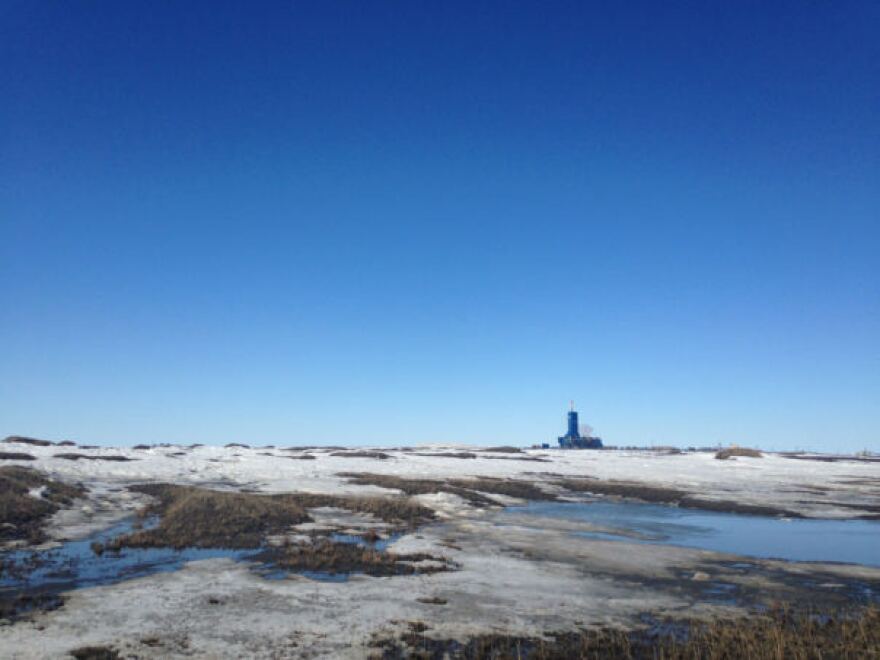An investigation published Friday by Buzzfeed News revealed BP Alaska was responsible for a series of safety incidents on the North Slope this year, some of which put workers at risk.
BP isn’t disputing that the incidents took place. The company has already taken extreme steps to address the issue.
As part of its report, BuzzFeed obtained a recording of Jeff Kilfoyle, health and safety manager for BP Exploration Alaska, talking to workers this September.
“Obviously any gas release is not a good thing. But a gas release of that magnitude inside a structure with people is obviously a major concern to us within Alaska and within the business,” Kilfoyle said. “That’s not a place we want to be.”
Kilfoyle was talking about a previously unreported safety incident that happened on September 10. According to BuzzFeed, two workers were exposed to a gas leak inside a building at one of BP’s drill sites. The workers weren’t injured, but the situation could have led to a deadly explosion. This was one of five spills or leaks — called Tier 1 events — that BP Alaska was responsible for this year, BuzzFeed reports.
It also reports that BP dealt with 27 worker accidents in Alaska as of Sept. 12. Buzzfeed obtained emails showing BP’s leaders were so alarmed by the incidents they forced many of their employees to halt work for the first 12 days of October. BP operates Prudhoe Bay, the biggest oil field in Alaska. All work was halted except operating the field, drilling wells and operations required to meet regulatory and safety standards.
In an email to the company workers, BP Alaska President Janet Weiss said, “I am deeply concerned that with these trends, we are not in a stable state.”
Cathy Foerster, who sits on the Alaska Oil and Gas Conservation Commission, said the incidents described in the report are troubling, but she also thinks BP is taking the right steps to address the situation.
“Of course it’s concerning and you can tell Janetis concerned,” Foerster said. “When you see a trend of either unsafe or un-environmentally sensitive events, then you definitely need to step back and take a time out, take a look at what you’re doing and assess what you need to change. And that’s what BP did.”
Foerster did dispute Buzzfeed’s implication that two of the incidents it described were caused by human error. Foerster said her agency is investigating those incidents and believes they were mechanical failures.
Foerster said because her agency only has jurisdiction over two of the incidents, she couldn’t comment on whether the age of BP’s facilities was a factor.
Richard Sears, a professor of energy resources engineering at Stanford, said the fact that Prudhoe Bay has been online for 40 years could be leading to issues, but that’s likely not the full story.
Sears, who advised the presidential commission that investigated the Deepwater Horizon Oil Spill, thinks BP is right to be worried. But he added that not all five of the leaks outlined in Buzzfeed’s report are equally serious.
“The bottom line: Is BP some kind of a scoundrel because of all this? Not really. Have they possibly let maintenance and good safety practice lapse a little bit in the last few years? That’s very possible,” Sears said. “Does it mean that something really bad is about to happen on the North Slope? I don’t think so. I always think that when a company recognizes they’ve got a problem, that’s the first step, right?”
Lois Epstein of the Wilderness Society said she’s disturbed that the public didn’t know about these incidents before Buzzfeed reported on them.
“There’s a lot of information in this report that says things were going badly for BP, and we didn’t know anything about it — the public didn’t know anything about it,” Epstein said.
In response to the report, BP sent Alaska’s Energy Desk the same written statement it sent to Buzzfeed. According to the statement, safety and protecting the environment are the company’s “top priorities,” and its pipeline assurance program performs close to 300,000 inspections each year.
“BP reports all incidents in accordance with state and federal laws, including two natural gas releases earlier this year at a Prudhoe Bay drill site and Flow Station 3,” spokeswoman Dawn Patience said in the written statement. “While the goal is to have no releases, both of these incidents occurred during planned maintenance and were halted quickly, and neither resulted in injury to workers or impact to the surrounding environment.”
